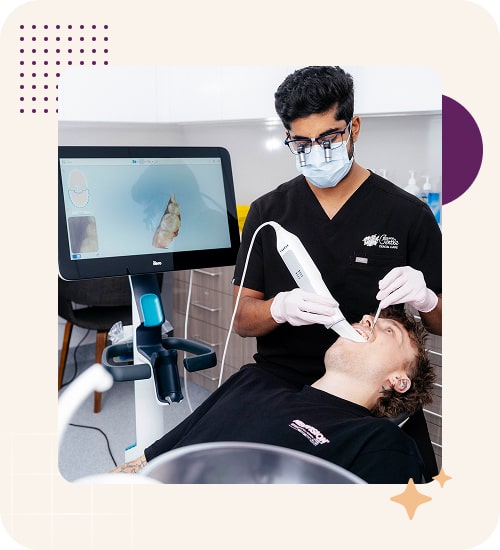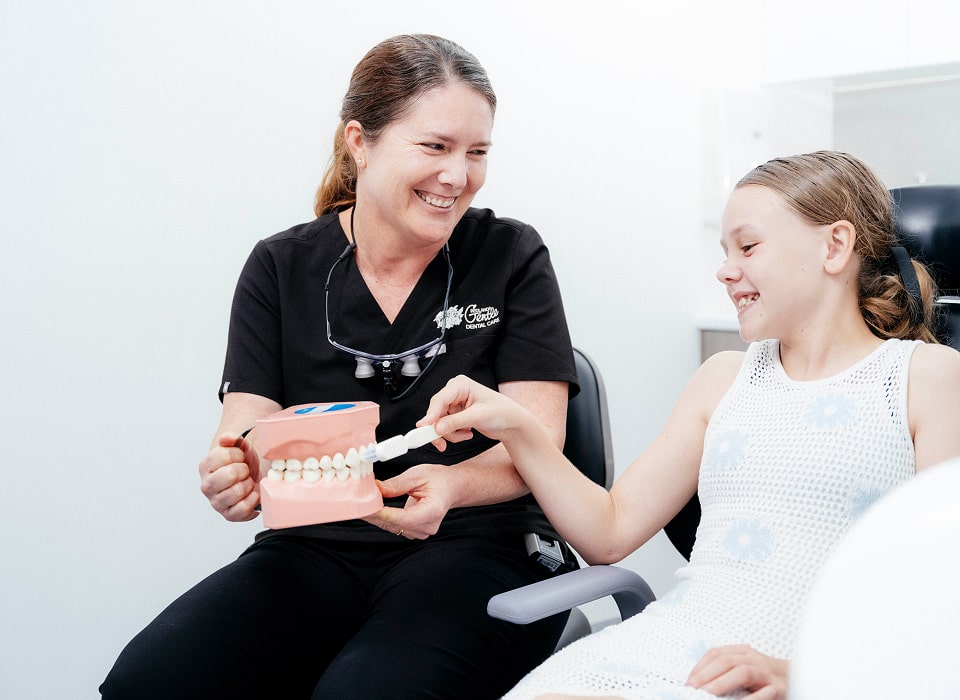Enhance Your Oral Health and Smile Aesthetics with Our Trusted, High-Quality Dental Bridges
Why Choose Us
Choose Redlands Gentle Dental Care for Trusted and Quality Dental Care Services

Experience Gentle, Personalised Dental Care

Meet Our Experienced and Empathetic Team

Enjoy Comprehensive Dental Services Under One Roof

Feel at Home in Our Family-Friendly Atmosphere

Benefit from Affordable and Transparent Pricing

Trusted Community Pillar with 40 Years of History

Discover How Traditional Dental Bridges Restore Your Smile and
Tooth Function
Is the Dental Bridge Procedure Right for Your Smile Restoration?
If you are considering getting dental bridges, finding out if you are a suitable candidate is essential. Our dental team can assess your situation and help you decide if bridges are the right option. Here are the criteria for eligibility:
- Candidates must have one or more missing teeth that they want to replace to restore both functionality and aesthetics for improved overall dental health and confidence.
- Applicants should have healthy teeth beside the gap that can effectively support the dental bridge.
- Patients must be free of severe oral health issues, like decay or advanced gum disease, that could compromise treatment success.
- Patients must be committed to maintaining good oral hygiene and attending regular dental visits consistently.


The Benefits of a Traditional Dental Bridge Explained
Dental bridges offer a range of benefits for those with missing teeth. They not only improve oral health but also restore the aesthetics of your smile, significantly enhancing your confidence and overall quality of life.
- Dental bridges restore chewing and speaking abilities, distributing bite forces evenly across remaining teeth to prevent wear on remaining teeth.
- A dental bridge maintains facial shape and prevents teeth from drifting, preserving natural bite alignment and facial structure.
- Bridges made of porcelain fused to metal or an all-porcelain framework blend with natural teeth, enhancing smile aesthetics.
- Bridges can last many years with proper care, including regular dental check-ups and brushing with fluoride toothpaste.

Experience the Difference of Gentle Care with Us
How We Can Help
Learn How Dental Bridges Can Address Your Dental Problem
Unhappy With My Smile
I Have Missing Teeth
Unhappy With My Dentures
Seeking Smile Improvement
Our Payment Options
Find What Works for Your Financial Needs With Our Dental Payment Options
Child Dental Benefits Schedule
Invest in your child's smile with the Child Dental Benefits Schedule (CDBS). This government program offers eligible families financial support for essential dental services, promoting good oral health habits from an early age.
The CDBS covers up to $1,095 over two years for basic dental care like check-ups, cleanings, and fillings for children aged zero to 17. Eligibility depends on Medicare status and specific government payments, making quality dental care more accessible to families.
Learn MoreDental Services for DVA Card Holders
Veterans deserve high-quality dental care, and the Department of Veterans' Affairs (DVA) program delivers just that. The program offers dental benefits that vary based on card type.
Gold Card holders receive comprehensive cover for clinically necessary treatments, from routine check-ups to advanced procedures. White Card holders are covered for dental care related to accepted service-related conditions or mental health needs. Our clinic proudly supports veterans by providing high-quality dental care to maintain their overall health.
Learn MoreHumm
Simplify your dental care payments with Humm, a flexible financing option that lets you smile now and pay later. This interest-free payment plan allows you to spread the cost of your dental treatments over time, making essential care more accessible.
Humm is available for various dental services, from routine check-ups to more complex procedures. With instant approval and the ability to manage your account online, Humm helps you prioritise your oral health without financial stress.
Learn MoreZip
We offer Zip to help patients manage treatment costs. With credit limits between $1,000 and $50,000, eligible patients can select flexible repayment terms from three to 60 months, making it easier to manage costs.
Zip is ideal for anyone needing dental care without upfront costs. The user-friendly app allows you to track payments easily, so you can stay on budget while prioritising your oral health.
Learn MoreSuperCare
With the help of SuperCare, eligible patients can release their superannuation funds early to access essential dental procedures. This option is suitable for families lacking sufficient health funds or available resources, covering services such as orthodontics, implants, and root canal therapies.
SuperCare's consultants guide you through the straightforward application process, simplifying what can often be complex. This service enables you to prioritise your family's oral health without the burden of upfront costs.
Learn MoreAfterPay
Experience the convenience of dental care with Afterpay, allowing you to receive treatments now and pay later in four easy instalments over six weeks. This payment option is available to anyone over 18, a practical choice for adults looking to enhance and maintain oral health.
With no interest charges when payments are made on time, Afterpay promotes responsible budgeting. Payments are automatically deducted from your linked debit or credit card for a smooth experience.
Learn MoreBupa Preferred Provider
Enjoy exclusive benefits and hassle-free claims when you choose our clinic, a Bupa Preferred Provider, for your dental health needs. Our patients can access a comprehensive range of services, including check-ups and major procedures, often at reduced out-of-pocket costs.
Members First Ultimate also offers 100% back on two dental check-ups and cleans every six months, making regular oral care more affordable. Our partnership with Bupa allows you to receive quality care while maximising your benefits.
Learn MoreHCF Preferred Provider
Experience affordable, high-quality dental care at Redlands Gentle Dental Care. As an HCF preferred provider, patients with eligible dental cover can access reduced out-of-pocket costs, no-gap services for selected treatments, and streamlined claims processing.
HCF members can take advantage of these benefits by choosing our clinic for their dental needs. Check your policy to understand covered treatments and annual limits, and let us help you achieve a healthier, brighter smile.
Learn Morenib Preferred Provider
Access professional dental care at our clinic, a trusted part of nib's First Choice network. As a nib Preferred Provider, we offer members the opportunity to receive quality dental care at agreed rates. This provides a transparent and straightforward experience for your dental needs.
Nib members benefit from reduced out-of-pocket costs and simplified claims processes at our clinic. To make the most of your cover, review your policy for applicable limits and service inclusions.
Learn MoreAnswers About Dental Bridges
Frequently Asked Questions
How many missing teeth can be replaced by a dental bridge?
A dental bridge is a versatile option designed to replace one or more missing teeth. The exact number of missing teeth it can replace depends on several factors, including the number, health and attachment of the adjacent teeth that will be used as supporting abutment teeth.
Bridges can replace up to four missing teeth, depending on the type of bridge used and the condition of the supporting teeth.
Types of bridges that influence this:
- Traditional bridges:
Used to replace one to two missing teeth, anchored to healthy adjacent teeth. - Implant-supported bridges:
Can replace several missing teeth (three or more) by anchoring the bridge to dental implants instead of natural teeth. - Cantilever bridges:
Suitable for replacing a single missing tooth when support is available on only one side of the gap.
When considering replacing teeth with bridges, using high-quality materials is crucial for promoting durability. With proper care, bridges can last over a decade. Regular dental hygiene routines and professional check-ups are essential for maintaining oral health. This also helps prevent oral health issues like tooth decay or gum disease around the bridge.
How many teeth are needed to support a bridge?
To support a dental bridge, usually, two healthy teeth are needed on either side of the gap left by a missing tooth. These teeth serve as abutments, which are crowned to hold the bridge in place.
- Single Missing Tooth:
For a standard three-unit bridge, two crowns are placed on the abutment teeth, and one false tooth (pontic) fills the gap. - Multiple Missing Teeth:
If more than one tooth is missing, additional crowns and pontics will be required, and more abutment teeth may be needed depending on the number of teeth to be replaced.
If there are not enough healthy teeth to support a bridge, other treatment options, such as implant-supported bridges, may be recommended. Understanding what dental bridges are is crucial for assessing your options.
How many sessions are required for a dental bridge procedure?
A dental bridge procedure generally requires two to three sessions, depending on the complexity of the case and the type of bridge being placed.
- Initial appointment:
During the first visit, the dentist evaluates your overall dental health and suitability for the procedure. Before proceeding, any oral health issues may be addressed with tooth fillings or other necessary dental treatment. - Preparation and impressions:
The neighbouring teeth are reshaped to accommodate dental crowns that anchor the bridge. Impressions of the teeth are taken to create a bridge that fits precisely. A temporary bridge is placed to protect the reshaped teeth and maintain the natural appearance of your smile while the final bridge is fabricated. - Final placement:
At the last visit, the final bridge is fitted and adjusted. The dentist checks the alignment and function to address any potential bite issues.
After the procedure, maintaining good oral hygiene is essential for the bridge and surrounding tooth structure. This helps protect the teeth with bridges and preserve your smile’s seamless, natural look.
Is the process of getting a dental bridge painful?
A dental bridge procedure is generally not painful. Modern dental techniques and the use of local anesthesia allow patients to remain comfortable throughout the procedure. Here are some key points regarding the pain associated with dental bridges:
- Painless Procedure:
The preparation for a dental bridge, which includes numbing the area around the teeth and taking impressions, is typically painless due to local anesthesia administered by the dentist. Most patients do not experience pain during the actual procedure. - Post-Procedure Sensitivity:
After the placement of a dental bridge, some individuals may experience mild sensitivity or discomfort as their mouth adjusts to the new restoration. This is a normal response and usually subsides within a few days. Over-the-counter pain relievers can help manage any minor discomfort during this adjustment period. - Consultation for Persistent Pain:
If pain persists beyond a week or worsens, it is essential to consult a dentist, as this could indicate an underlying issue such as improper fit, infection, or decay.
Overall, while there may be some minor discomfort associated with getting used to a new dental bridge, the procedure itself is designed to be as comfortable as possible.
How long does a dental bridge last?
The durability of a dental bridge is influenced by key factors that impact its performance over time.
- Dental bridge care:
Maintaining good oral hygiene, such as regular brushing, flossing, and professional cleanings, helps prevent decay and gum issues around the bridge. - Type of bridge:
Different bridge options, such as implant-supported dental bridges, may last longer due to their added stability and support. - Condition of supporting teeth:
The health of the natural teeth used as anchors plays a significant role. Weakened or decayed teeth can compromise the bridge’s lifespan. - Material quality:
High-quality dental bridges made from durable materials are better at withstanding wear and tear over time. - Daily habits:
Avoiding habits such as grinding teeth or chewing on hard food or objects helps prevent unnecessary stress on the bridge.
When considering what dental bridges are, it’s important to note that a well-cared-for dental bridge can last over 10 years with minimal complications when these factors are managed effectively.
How can I properly maintain a dental bridge?
Maintaining teeth with bridges requires consistent care to protect their function, appearance, and the surrounding teeth and gums. Follow these tips to keep your bridge in great condition and support overall oral health:
- Oral hygiene routine:
Brush twice daily and floss carefully around the bridge. Use tools like floss threaders or interdental brushes to clean beneath the bridge. - Regular dental check-ups:
Routine visits allow your dentist to monitor the bridge and check for any signs of poor gum health or decay around the supporting teeth. - Dietary habits:
Avoid chewing on hard or sticky foods that can stress the bridge. A balanced diet supports overall jaw health and reduces the risk of bone loss. - Special attention to gum health:
Clean the gums beneath the bridge carefully to prevent plaque buildup and avoid gum issues. - Address issues promptly:
If the bridge feels loose or causes discomfort, visit your dentist to prevent further complications.
Following these tips for proper dental bridge care provides significant health advantages and helps maintain the function and appearance of your bridge.
How do you know when a dental bridge needs to be replaced?
Recognising when a dental bridge needs to be replaced is essential for maintaining comfort, function, and appearance. Here are key signs to watch for:
- Discomfort or pain:
If the bridge feels loose or causes irritation, it might indicate issues with the supporting teeth or gums. - Changes in appearance:
A worn or damaged bridge can lead to an aged or sunken appearance, especially if the surrounding teeth or jawbone have deteriorated. - Issues with function:
Difficulty chewing or changes in your bite can result from misalignment caused by an improperly fitting bridge or irregular teeth. - Damage to the Bridge:
Cracks or visible wear in the bridge may compromise its structure and function, requiring examination.
Regular dental care and professional examinations are essential to monitor the condition of the bridge and surrounding teeth. Addressing these signs promptly during routine visits can help maintain oral health.
What are the limitations of a dental bridge?
While a dental bridge is a reliable option for replacing missing teeth, it still has certain limitations.
- Impact on supporting teeth:
The dental bridge procedure requires reshaping the adjacent teeth to create space for the bridge, which is an irreversible process. - Potential for decay:
If proper dental care is not maintained, the supporting teeth under the bridge are at a higher risk of decay and gum issues. - Limited lifespan:
With good care, bridges can last over 10 years, but they may eventually need replacement due to wear or damage.
These considerations can help determine whether a dental bridge is the right option or whether alternatives should be explored.
Do dental bridges cost more than crowns?
Teeth with bridges generally cost more than crowns because they replace missing teeth and require more materials and preparation.
Several factors influence the cost of dental bridges.
- Number of teeth replaced:
A dental bridge replaces at least one missing tooth and requires crowns on the supporting teeth. This additional work increases the overall cost of dental bridges compared to a single crown. - Material used:
The material plays a significant role in pricing. Ceramic and porcelain bridges usually range from $1,700 to $1,900 per unit, with porcelain often chosen for its natural appearance. - Type of bridge:
Complex options, such as a two-tooth cantilever dental bridge with a crown, may cost up to $4,540 due to the special preparation and craftsmanship involved. - Geographic location and dentist fees:
The cost of dental bridges can vary based on location and the dentist’s experience. Urban clinics may have higher fees than rural ones. - Complexity of the case:
Higher costs may result from cases requiring additional procedures, such as addressing underlying dental issues or structural challenges.
Knowing the factors that affect the cost of dental bridges helps you choose the right option for your needs and budget.
